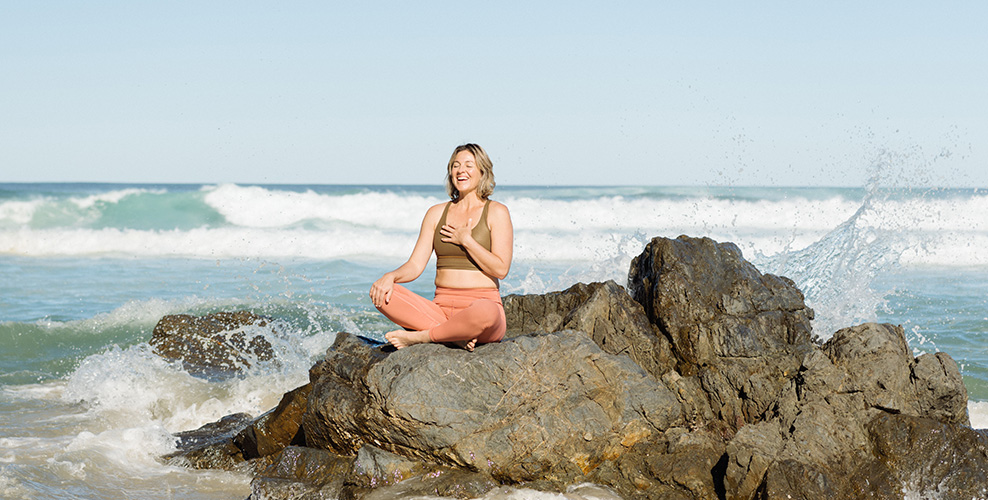B vitamins: benefits and how to get more in your diet

Up to 72% of Australians feel stress has an impact on their physical wellbeing, according to The Australian Psychological Society.[1] Many of us are looking for stress support, as well as a boost in energy! If you lead a life where you feel like you’re being pulled in multiple directions - juggling work, study, and family, for example - ensuring you’re getting enough B vitamins through your diet can be a total gamechanger. Read on to find out more about some of the ways that B vitamins could benefit you.
Quick overview
- B vitamins all play important roles in the body, but they work best together as a group, called B-group vitamins.
- B-group vitamins support healthy energy levels, stress responses in the body, mood balance and nervous system function.
- B vitamins are found abundantly in loads of delicious foods including wholegrains, nuts and seeds, and green leafy vegetables.
B vitamin benefits
B-group vitamins consist of 13 different vitamins, some of which have a ‘synergistic effect’ – a fancy way of saying they ‘buddy up’, working together to support a variety of processes in the body.[2]
B Vitamins and stress
Stress is an unavoidable fact of life for many of us. If you’re a regular reader of our blog, you probably already know about the benefits of stress-busting activities like bushwalking and qi gong. These are a fantastic way to support your nervous system to cope with stress. For additional stress support, vitamins B5 and B6 are your B-group vitamins to look out for as they are involved in supporting healthy responses in the body.[3] The nervous system is an important part of the stress response, and vitamins B1, B2, B6, B12 and biotin are all important for healthy functioning of the nervous system.[4,5,6]

B Vitamins and energy
B-group vitamins are also important for supporting energy levels. Vitamins B1, B2, B3, B5, B6, B12 and biotin help to maintain energy levels and vitality.[6,7,8]
B vitamins and cognitive function
Most of us want to feel like we’re always switched on, able to concentrate, learn new skills and do our jobs well. When it comes to supporting brain function and health, there’s a handful of B vitamins that standout including vitamins B5, B6 and B12. Other B-complex vitamins that are important for supporting cognitive function include vitamins B1, B3, B6, biotin and folic acid.[4]
B vitamins and mood
Everyone’s allowed a bad mood from time to time, but if it’s becoming a regular occurrence you may want to consider some nutritional support. Vitamin B6 is important for healthy mood balance. It’s also needed for the production of several neurotransmitters (brain chemicals that transmit signals from one part of the nervous system to another) including serotonin, sometimes called the body’s ‘feel good chemical’.[9,10]
B vitamins and metabolism
Vitamins B2, B3, biotin and B12 are also used by the body to help break down fats, proteins and carbohydrates.[11,12,13] Folate and vitamin B6 also support normal red blood cell formation. So, as you can see, getting a range of B vitamins is always better than just one.
Foods that contain B vitamins
The first step to incorporating B vitamins in your diet is to always eat whole, unprocessed versions of foods i.e. wholegrains instead of refined. If you have a diet filled with vegetables (especially of the leafy green variety), protein and wholegrains, there’s a good chance you’ll be getting plenty of your B vitamins.
Including the foods below in your daily diet will ensure you’re getting a full range of B vitamins:[14]
- Whole grains – brown rice, barley, spelt, kamut, wheat, rye
- Nuts and seeds
- Leafy green vegetables - kale, spinach, bok choy, watercress, lettuces, and swiss chard
- Fish
- Chicken
- Red meat
- Liver
- Legumes
- Eggs
- Mushrooms
Foods high in vitamin B12:[15]
- Beef
- Chicken
- Cheese
- Eggs
- Fish – especially salmon, trout, sardines and tuna
- Dairy products – milk, yoghurt
B12 gets a special mention because it’s not present in high amounts in plant-based foods. If you’re a vegan, vegetarian or otherwise minimise animal-based foods, make sure you maximise your intake of plant-based sources of vitamin B12 including nutritional yeast, tempeh, chlorella and nori seaweed.

B Complex Advanced
If you’ve been nodding along to the many benefits of B vitamins and you‘d like to try a supplement for additional support – there’s help! Fusion B Complex Advanced is a high-strength B complex formula designed to support a healthy stress response in the body with vitamins B5 and B6, energy levels with B1, B2, and B12, and mood balance, brain and cognitive function and nervous system function with B6.
Increasing demands in your life shouldn’t mean running on empty. Getting enough B vitamins can help you re-fill your tank – with a bonus of supporting energy levels, vitality and general wellbeing.
Always read the label and follow the directions for use.
References:
- Australian Psychological Society. 2015. Accessed August 2021 https://www.psychology.org.au/getmedia/ae32e645-a4f0-4f7c-b3ce-dfd83237c281/stress-wellbeing-survey.pdf
- Harvard Medical School. Last updated 2009, accessed September 2021 from https://www.health.harvard.edu/newsletter_article/Nutritions-dynamic-duos
- Pizzorno J, et al. Textbook of Natural Medicine, 4th Ed, 2013. Elsevier, USA.
- Gropper S, et al. Advanced Human Nutrition and Metabolism, 2005. Thomson & Wadsworth, USA.
- Food Standards Australia New Zealand. Australia New Zealand Food Standards Code – Standard 1.2.7 – Nutrition, Health and Related Claims. Accessed August 2021 from https://www.legislation.gov.au/Details/F2014C01191
- European Food Safety Authority. EFSA Journal 2010;8(10):1759. https://efsa.onlinelibrary.wiley.com/doi/pdf/10.2903/j.efsa.2010.1759
- European Food Safety Authority. Scientific opinion on the substantiation of health claims related to vitamin B6 and contribution to normal energy-yielding metabolism (ID 75,214), pursuant to Article 13(1) of Regulation (EC) No 1924/2006. EFSA Journal 2010;8(10):1759.
- Higdon J, et al. An Evidence Based Approach to Vitamins and Minerals, 2012. Georg Thieme Verlag, Germany.
- Hendler S. PDR for Nutritional Supplements, 2nd Ed, 2008. Thomson Reuters: USA.
- Coates P, et al. Encyclopedia of Dietary Supplements, 2nd Ed, 201. Informa Health Care.
- Linus Pauling institute. Vitamin B2, Oregon State university 2019, accessed August 2021 from https://lpi.oregonstate.edu/mic/vitamins/riboflavin
- Godsey C, Horowitz D, and Sather R. Niacin, Health Encyclopedia, University of Rochester Medical Center 2019, accessed August 2021 from https://www.urmc.rochester.edu/encyclopedia/content.aspx?contenttypeid=19&contentid=VitaminB-3
- Braun L, and Cohen, M. Herbs and Natural Supplements, Volume 3: An Evidence-Based Guide. Elsevier Health Sciences, 2015.
- Better Health Channel. Vitamin B. Last updated May 2020, accessed August 2021 from https://www.betterhealth.vic.gov.au/health/healthyliving/vitamin-b
- Healthline. Top 12 Foods That Are High in Vitamin B12. Last updated March 2021, accessed August 2021 from https://www.betterhealth.vic.gov.au/health/healthyliving/vitamin-b

















